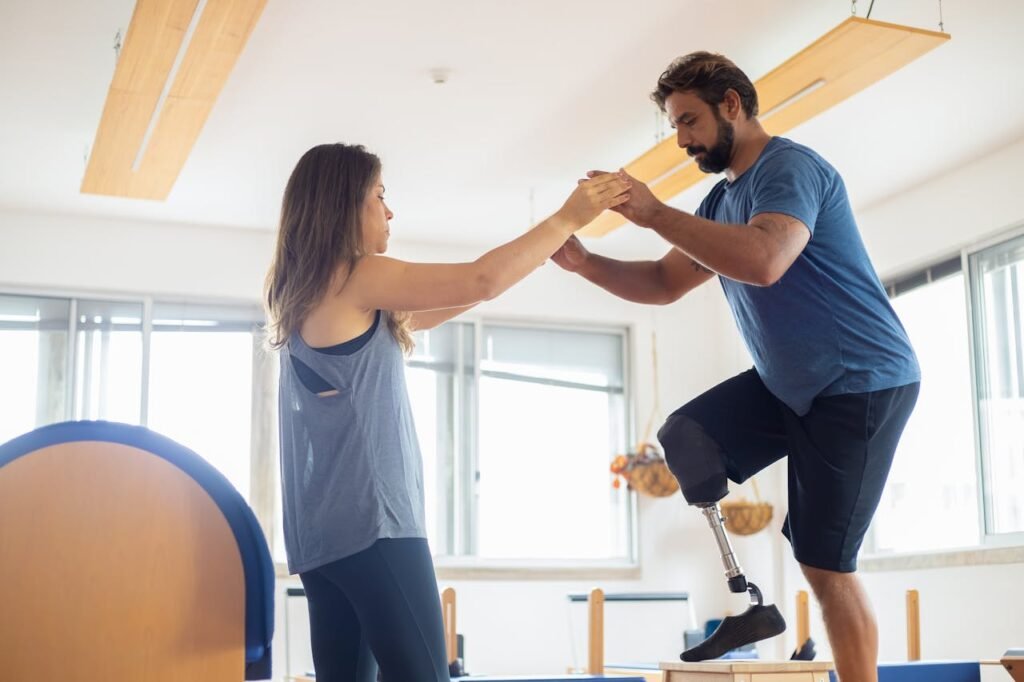Every job has its rhythm. For some, it’s the steady tap of keys on a keyboard. For others, it’s the sound of tools turning or boxes being lifted. For people using prosthetic hands, getting back to that rhythm can feel like a huge step toward normal life again.
At Robobionics, we believe that returning to work isn’t just about fitting a prosthetic—it’s about rebuilding confidence and independence. That’s why our workplace simulation demos are designed to help users try real tasks before they commit. You don’t just hold a cup or press a button—you use real tools, type on real keyboards, and lift real objects in real-world settings.
This article will take you inside those sessions: how they work, what we test, how you can prepare, and why this approach changes everything. Whether you’re an HR manager, a clinician, or someone considering a prosthetic for daily or professional use, you’ll see exactly how realistic training creates lasting success.
Why workplace task simulation matters
Bringing work life into prosthetic training
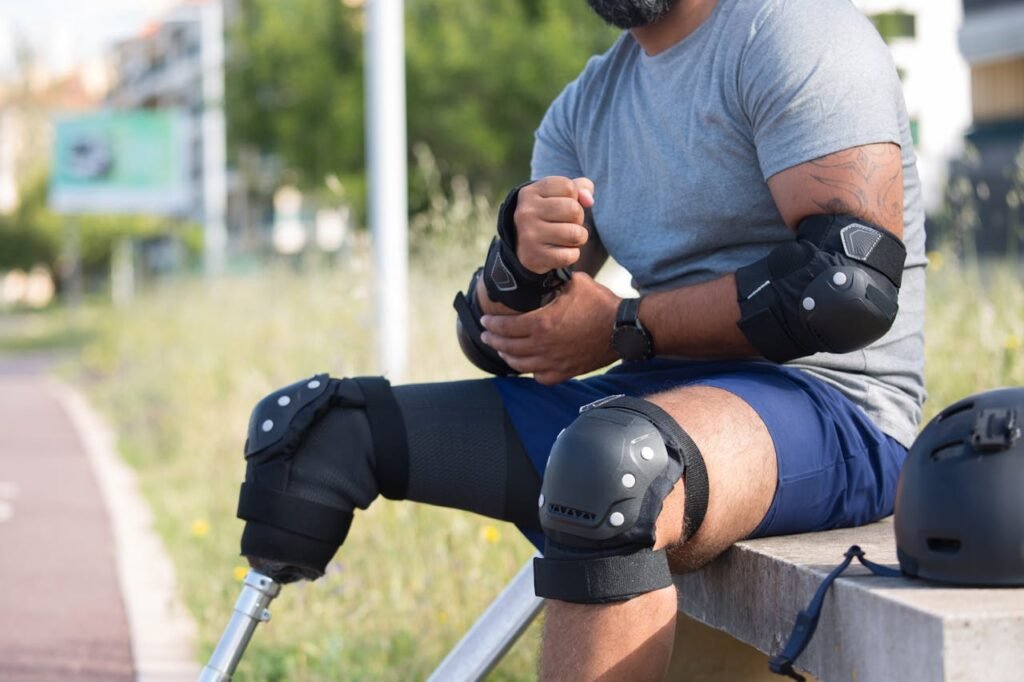
When a person receives a new prosthetic hand, their first thought is often, “Can I work again?” Our demos answer that question directly. Instead of abstract exercises, we create a mini version of your workspace. You can practice typing, using screwdrivers, lifting files, or even handling delicate parts.
This experience gives instant clarity. You don’t just see how the prosthetic looks—you feel how it performs in action. Users often walk away realizing what adjustments or grip patterns will help them perform better on the job.
Confidence through real motion
Doing a real task builds more confidence than any explanation ever could. When you type an email or hold a wrench using your new hand, your mind begins to trust your body again. That small success rewires belief.
Our goal is to turn that belief into daily performance. By repeating familiar work actions, your brain and muscles adapt faster. That means less learning time and more confidence to return to work.
Reducing job-related anxiety
Many people worry that their prosthetic won’t keep up with their job’s pace. Some fear it will slow them down or draw attention. Workplace simulation helps erase those fears.
When you’ve already tested tasks in a safe setting, your first day back at work feels smoother. You know what to expect and how to handle it. That calmness is a quiet but powerful form of recovery.
How we design the simulations
Understanding your job
Before the demo, our team spends time learning what you actually do at work. Whether you’re an engineer, teacher, office executive, or craftsperson, we study your typical day. We ask about the tasks that matter most—typing, gripping, rotating, or carrying.
This helps us design a simulation that reflects your exact needs. A carpenter might test tool control; a designer might test typing and mouse handling. Customization keeps training meaningful.
Setting up realistic workspaces
We recreate small work zones inside our demo rooms—office desks, workbenches, or packing stations. Everything feels familiar and comfortable.
Our prosthetists arrange tools and materials just as they would appear in a real workspace. The aim is not perfection but realism. It’s about helping you see how your prosthetic performs where you’ll actually use it.
Mixing safety with authenticity
All our simulations include light, safe versions of real tools. We ensure nothing causes strain or injury. At the same time, the setup is close enough to the real thing to provide genuine practice.
Users handle these tasks under supervision. That way, if something feels hard, we adjust grip force, control speed, or socket fit immediately.
Tools and grip simulation
Handling simple tools

For those in technical or mechanical jobs, we start with basic tool use. You’ll hold and rotate screwdrivers, hammers, or pliers. The goal is not to test strength, but control.
Our myoelectric systems respond to your natural muscle signals. When you tighten or loosen your forearm muscles, the prosthetic responds smoothly. You see how each grip pattern—power, precision, or tripod—works differently for each tool.
Practicing complex tasks
Once you feel comfortable, we move to slightly harder tasks—turning knobs, holding nuts, or steadying pipes. These tasks show you how grip adjustment and wrist angle matter.
If you work in maintenance, lab setup, or electrical assembly, these demos mimic real challenges you’ll face daily. We note every movement and guide you on how to reduce fatigue while improving accuracy.
Adapting to vibration and weight
Tools sometimes vibrate or feel heavy. The prosthetic’s sensors and materials absorb much of this vibration. Still, each person’s comfort varies. During simulation, we track your feedback closely and adjust padding or settings.
By the end, most users can manage steady tool control for five to ten minutes—enough to rebuild confidence and rhythm.
Typing and digital tasks
Learning fine motor control
Typing feels different with a prosthetic hand, but it’s not difficult to master. In our simulations, you’ll start by pressing single keys and then progress to short sentences.
The Sense of Touch feedback in our bionic hand helps you sense pressure while typing. You learn the exact amount of force needed for smooth, quick motion. Within a few sessions, many users can type comfortably at office speed.
Using a mouse and touchscreen
We also simulate digital tasks beyond keyboards. You’ll practice moving a mouse, tapping touchscreens, and using smartphones.
These tasks matter because modern work relies heavily on technology. Practicing them early prevents frustration later. With small wrist adjustments and proper finger alignment, fine control becomes natural.
Building accuracy and flow
Typing is not just about speed—it’s about rhythm. Once your brain syncs with the prosthetic’s signals, your fingers find their flow.
We encourage users to bring their own laptop or phone. Familiar devices make the experience personal and relevant.
Lifting and carrying tasks
The art of safe lifting
One of the biggest fears after amputation is dropping objects. Our lifting simulations rebuild trust by starting light—plastic bottles, books, or boxes.
You’ll learn to balance objects using both arms, adjusting grip pressure with your prosthetic. The Sense of Touch feedback tells you how much force you’re applying. This prevents both drops and over-gripping.
Gradual strength training
As your confidence grows, we increase object weight slowly. We track how your muscles respond and teach posture correction to avoid strain.
Proper lifting isn’t just about power—it’s about alignment. We focus on the coordination between your prosthetic and natural side. This improves balance and stability in daily life.
Applying it to real jobs
People in logistics, retail, and office roles benefit the most from lifting demos. It shows them how to move safely and efficiently again.
Even light lifting builds psychological assurance—you can participate fully in daily tasks again, not as an observer but as a doer.
The science behind task simulation
Muscle memory rebuilding
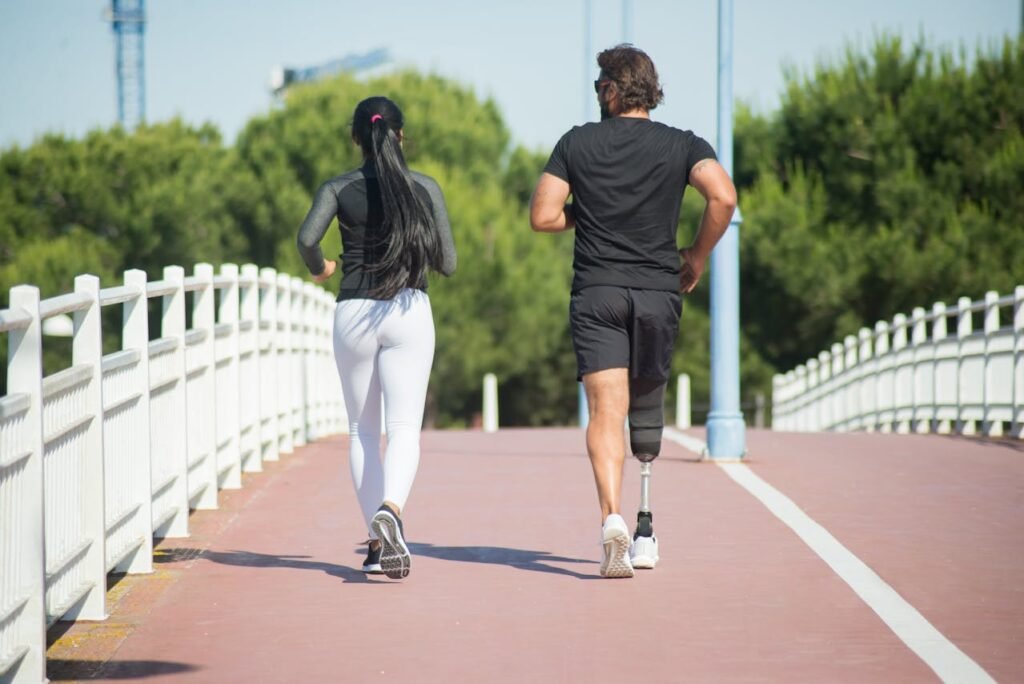
After amputation, the brain still remembers how to perform old actions. Task simulation taps into that memory. When you mimic real work, your neural pathways reactivate and adapt to the prosthetic.
With repetition, control becomes automatic. It’s the same principle used in sports rehabilitation—practice under realistic conditions until the body and brain move as one.
The role of sensory feedback
Our Sense of Touch system gives tactile signals when you grip or press. It helps users know when they’re holding too tight or too loose.
That feedback closes the mental gap between intention and action. You start feeling connected again—to objects, to work, to life.
Emotional learning
Simulation doesn’t only train muscles. It trains emotions. The moment you pick up a pen or tap a key again, something shifts inside—hope replaces hesitation.
That emotional spark is what keeps rehabilitation sustainable. Confidence isn’t taught in a manual; it’s built in moments of success.
Preparing for your workplace simulation
Before you arrive
Wear comfortable clothes and bring items you often use at work—your laptop, pen, or a small tool. The goal is to make the simulation as familiar as possible.
If you use any current prosthetic, bring it along too. Comparing how it performs against the demo hand gives useful insights for upgrades or adjustments.
Warm-up and relaxation
We begin with light stretching and breathing exercises. This helps muscles relax and improves control signals. Nervous energy often fades once the body feels calm.
Our clinicians stay close, guiding you through each movement. You can stop anytime. There’s no pressure, only progress.
Recording your experience
We encourage participants to note what felt easy and what felt tough. Keeping a short log helps our team customize future sessions.
These notes also help your employer or therapist plan your work re-entry with confidence and clarity.
Role of employers in prosthetic demos
Creating inclusive opportunities

Forward-thinking employers partner with us to include task simulation in their return-to-work programs. This builds confidence for employees and awareness for teams.
Seeing a prosthetic user perform tasks effortlessly breaks old myths about disability. It shows colleagues that capability never left—only the tools changed.
Custom workplace setups
Some companies allow us to recreate their exact workstation setups at the demo. This includes real tools, computers, and work furniture.
Testing in familiar surroundings gives more accurate results. It also helps employers identify what small adjustments—like desk height or grip aids—can make daily work easier.
Building trust and retention
When an employee returns stronger and more self-assured, loyalty deepens. The company gains not just a skilled worker but an inspired team member.
Prosthetic demo programs prove that inclusion isn’t theory—it’s action. It’s the bridge between recovery and productivity.
Partnering with occupational therapists
Shared goal of independence
Occupational therapists play a key role in our demos. They understand how people perform everyday work and movement. Together, we create exercises that mimic real life.
Their observations during simulations help us refine both prosthetic design and training. The collaboration ensures each user transitions smoothly from clinic to career.
Step-by-step adaptation
Therapists break down complex tasks into simple motions. You might start with picking up a pen, then move to typing, and later to multitasking with tools.
Gradual progress ensures learning feels rewarding, not overwhelming. Every small success counts.
Ongoing support
Even after the demo, therapists stay in touch. They help track progress, adjust routines, and prevent fatigue or strain. The continuity of care keeps long-term results steady.
Advanced ergonomic training
Why ergonomics matters
Good ergonomics makes a huge difference in how comfortable and efficient you feel at work. For prosthetic users, it’s even more critical. A small change in posture or desk height can affect how your socket feels, how much pressure builds up, or how quickly fatigue sets in.
During our demos, we show how to align your chair, monitor, and workspace so your prosthetic arm stays relaxed, not strained. Whether you sit at a computer or stand at a workbench, posture shapes comfort, control, and endurance.
Adjusting your environment
We help users understand how to adjust their surroundings instead of struggling to fit into them. Simple tweaks—like raising a table by a few centimeters, using angled supports, or moving a mouse closer—can cut effort in half.
We recreate those settings during simulations. You’ll see the difference right away. The goal isn’t just to make work possible; it’s to make it sustainable for long hours without pain.
Long-term posture care
Your body changes over time, and so does your strength. We teach small, preventive routines: shoulder rolls, stretching breaks, and wrist rotations. These protect against stiffness and repetitive strain.
Our trainers remind every participant—good ergonomics is not about equipment alone. It’s about listening to your body and making adjustments early.
Sensory adaptation and real-world coordination
How the brain adjusts to new input
When using a prosthetic hand, your brain learns to interpret feedback signals differently. The “Sense of Touch” system in Grippy sends small vibrations to tell you how tight your grip is. At first, it feels new or odd, but within days, your brain begins to treat those signals like real touch.
During demos, we teach how to notice and interpret this feedback. You learn when you’re holding something too tightly or too loosely. Over time, that awareness becomes second nature.
Rebuilding motion patterns
We guide users to coordinate eyes, muscles, and feedback simultaneously. It’s like learning to drive—first slow and conscious, then smooth and automatic.
Practicing with real tools, keyboards, and boxes helps your brain and hand sync faster than in clinical settings. Every repetition strengthens new neural connections that turn signals into skill.
Overcoming sensory fatigue
Just like muscles, your senses can tire too. Overusing a prosthetic can dull your perception temporarily. We teach rest cycles and short reset exercises. Closing your eyes for ten seconds or shaking your shoulders gently can restore clarity and reduce mental load.
Awareness of both physical and sensory fatigue helps you maintain focus without burnout.
Emotional reintegration at work
Facing the first day back
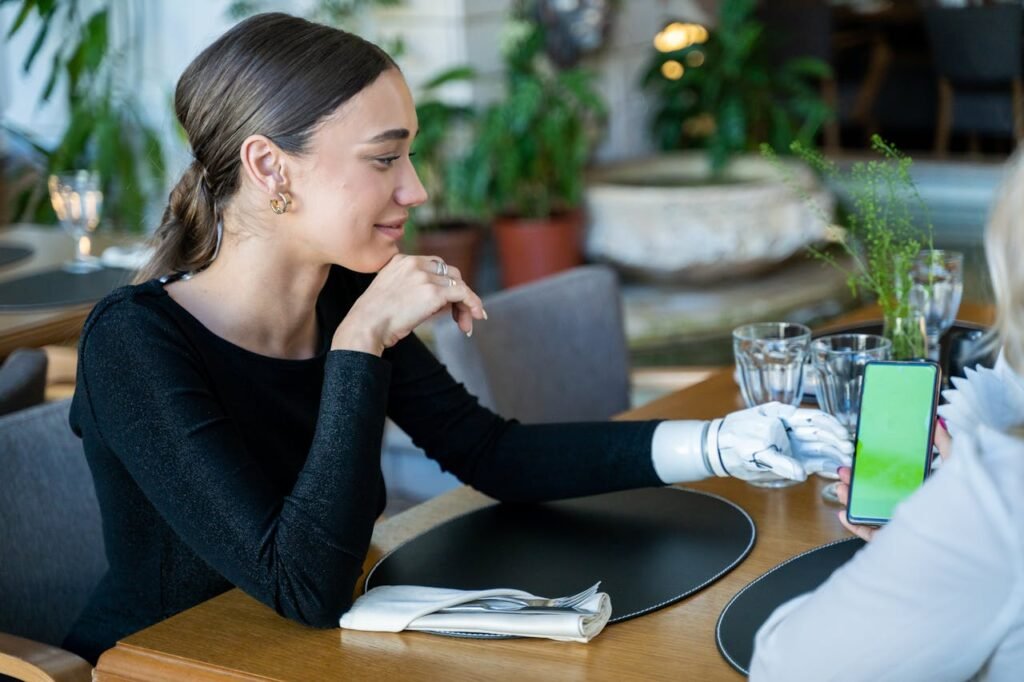
Many people feel nervous before returning to work after amputation. They wonder how colleagues will react or if they’ll be able to manage old tasks. The workplace simulation experience reduces that anxiety before it begins.
You already know your capabilities, your grip strength, and how to manage pressure. That knowledge builds calmness. When you walk into your office again, you do it with proof of what you can achieve.
Building self-assurance gradually
Confidence doesn’t appear overnight. It grows in small moments—typing your first full email, carrying a file across the room, or fixing a loose wire without hesitation.
Our team celebrates those milestones with you. Every success builds your story of recovery. That quiet pride turns into the steady confidence that defines your professional identity again.
Changing perceptions at the workplace
When co-workers see your skill and comfort with the prosthetic, their attitude shifts from sympathy to respect. They begin to see you not as “someone with a prosthetic” but as “someone who gets the job done.”
Our demos often include HR representatives and managers. Watching the session gives them practical insights into how simple adjustments can create inclusive, productive teams.
Funding and support for workplace prosthetics
Making affordability possible
A good prosthetic should not be a luxury. Robobionics designs every device to be world-class yet affordable. While imported options can cost over ₹10 lakh, our models range between ₹2–3 lakh, putting advanced technology within reach.
During demo sessions, we discuss funding options openly—government schemes, CSR partnerships, and EMI plans. Transparency ensures there are no surprises later.
CSR and NGO partnerships
Many companies and non-profits now support prosthetic sponsorship programs. We work closely with their CSR wings to fund employees or local beneficiaries who need devices for work.
These partnerships make the process faster and reduce the financial burden for users. It’s collaboration that changes lives quietly but powerfully.
Insurance and medical grants
Some insurance plans now include partial coverage for prosthetic limbs, especially for workplace rehabilitation. We help users with documentation and letters to make the claim process smoother.
Additionally, central and state-level disability welfare boards sometimes offer grants for job reintegration equipment. We guide every applicant step-by-step so no opportunity is missed.
Success stories that inspire
Manoj, the technician who rebuilt his rhythm
Manoj works in an electronics repair shop. After losing his hand in an accident, he thought his job was over. During our demo, he practiced holding a screwdriver and soldering small wires.
Within two weeks, he was back at his shop, working half-days. His confidence soared as he handled repairs on his own. He says the simulation helped him “trust the hand before returning to work.” Today, he trains apprentices and speaks at awareness events.
Priya, the teacher who types again
Priya teaches English and spends hours typing lesson plans. She joined a demo session focused on keyboard tasks. After learning pressure control, she regained her typing rhythm.
Her story spread across her school. She now mentors students with disabilities, showing them that technology can restore more than motion—it restores independence.
Sandeep, the warehouse worker
Sandeep’s job involved packing and lifting. He feared his body couldn’t handle it anymore. Our lifting simulation changed that. He learned correct posture and grip safety using boxes and crates.
Today, he works full-time again. His supervisor says Sandeep’s speed matches anyone else’s—and his story has inspired their company to hire more people with limb differences.
Rupa, the artist with a steady touch
Rupa paints delicate portraits. When she lost her hand, she feared she’d lost her gift. In her demo, we helped her practice holding brushes of different sizes and adjusting pressure through feedback.
Months later, she hosted her first exhibition titled “New Hands, Same Heart.” Her art captures the beauty of resilience—proving that creativity flows where courage lives.
Building a national network for workplace readiness
Bringing demos to every region
Robobionics partners with prosthetic centers, hospitals, and rehabilitation clinics across India. We aim to make workplace simulation a standard part of prosthetic care.
Whether you live in a metro or a small town, our team or partners can reach you. No one should have to travel far to try or train.
Partnering with industries
We collaborate with sectors like IT, manufacturing, retail, and healthcare to design task simulations specific to their work. For instance, a nurse may practice handling instruments, while a carpenter tests grip control for precision tools.
These collaborations help us design more refined prosthetics and prepare users for specific job conditions.
Creating inclusive communities
Our vision goes beyond prosthetic fitting—it’s about normalizing inclusion. Every successful simulation plants a seed of change in society.
We want companies, schools, and public offices to see prosthetic users not as exceptions but as capable professionals with enhanced tools.
The role of technology in simulation evolution
Real-time motion tracking
Our upcoming demo systems will include sensors that record joint movement and grip timing. These create digital reports showing progress with each session.
It’s like having a coach inside the prosthetic, helping you improve control with data-backed feedback.
Virtual simulation labs
We’re developing VR-based simulations that recreate digital offices and workshops. Users can practice coordination and speed virtually before trying it physically.
This reduces learning time and adds fun to training. It’s especially helpful for remote areas where physical demo centers are limited.
AI-driven customization
Artificial intelligence helps analyze your muscle signals during use. It adjusts sensitivity automatically for better control. Over time, it “learns” your motion style—just like your smartphone learns typing habits.
These innovations are designed to make prosthetics more intuitive and truly human-centered.
How to participate in a workplace simulation demo
Booking your slot
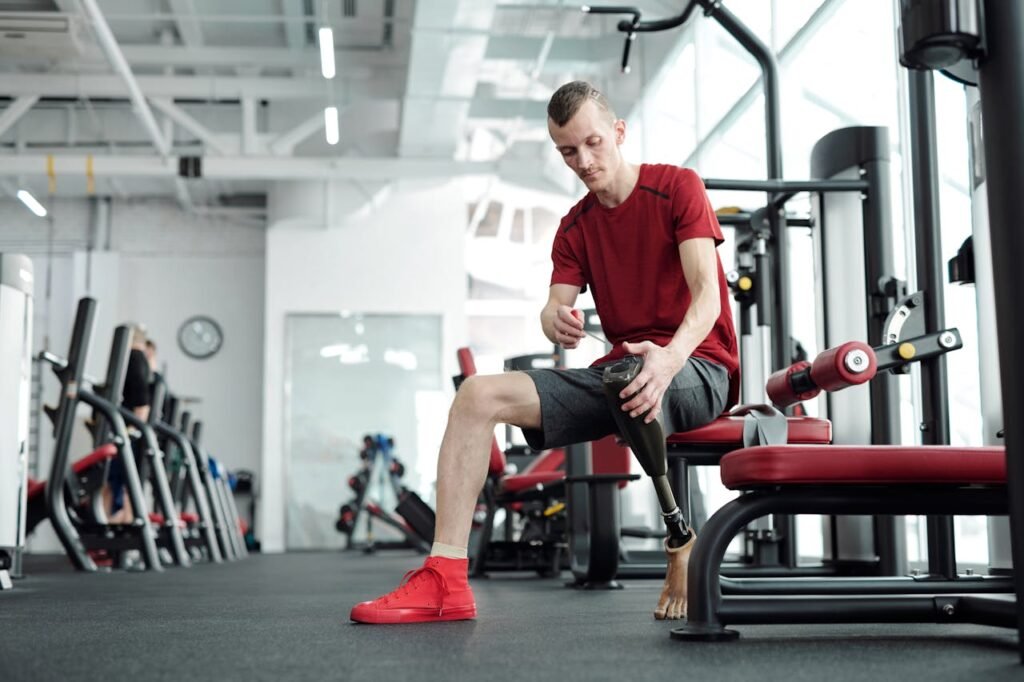
You can schedule a demo through www.robobionics.in/bookdemo. Choose “Workplace Simulation” under demo type. Add your city, job role, and availability.
Once booked, our team will confirm the date and share what to bring.
What happens during your session
You’ll start with an introduction to the prosthetic and a brief safety review. Then, you’ll perform light work tasks under supervision. Each task lasts a few minutes, and adjustments are made based on comfort and feedback.
By the end, you’ll have a clear sense of your potential—what works, what needs tuning, and how ready you are for your work environment.
Follow-up and training
After the session, we create a simple report with observations and recommendations. You can share it with your employer, doctor, or therapist.
If you wish to continue training, we connect you with local rehab experts who specialize in workplace reintegration.
Your next step
See it. Try it. Trust it.
Words can only explain so much. True confidence comes from experience. Book your workplace prosthetic simulation today and see how close you are to full independence.
Bring your reality
Bring your tools, laptop, or daily items. Let’s recreate your work, your way. You’ll leave knowing what your next step looks like—with proof in your own hands.
Together, we move forward
Robobionics stands for innovation with empathy. Our mission is simple: give every person in India access to world-class prosthetics that restore ability, pride, and purpose.
Because the future of work is not about limitation—it’s about adaptation. And with the right technology, every person can get back to doing what they love, confidently and freely.



